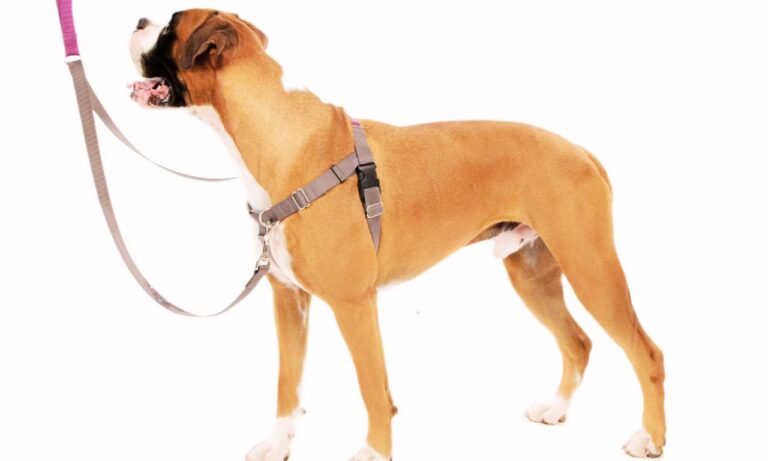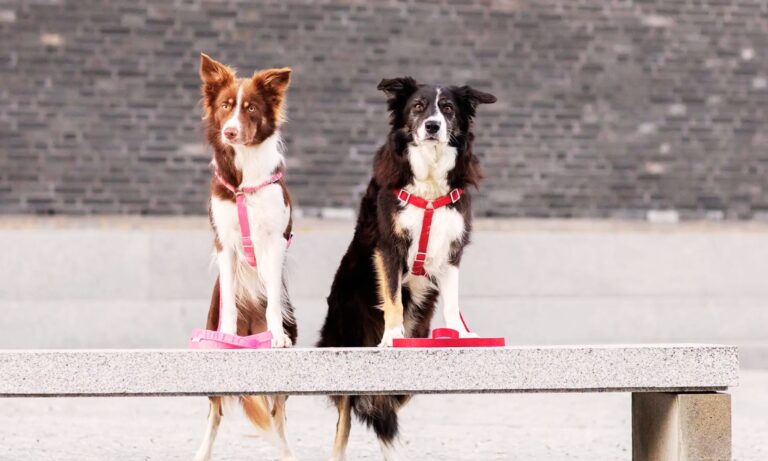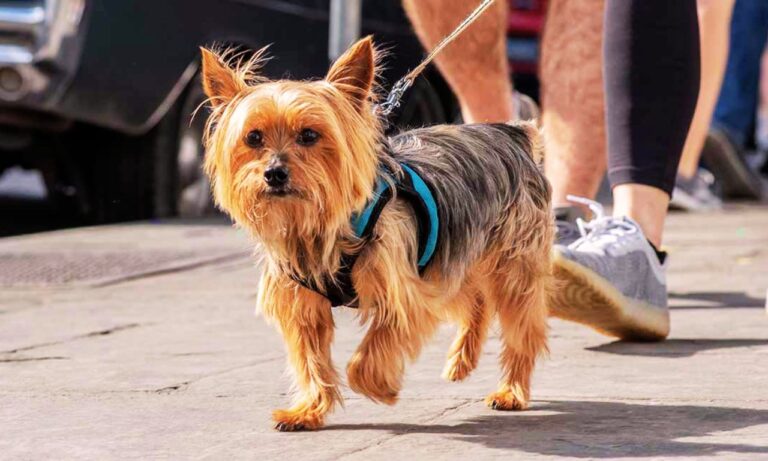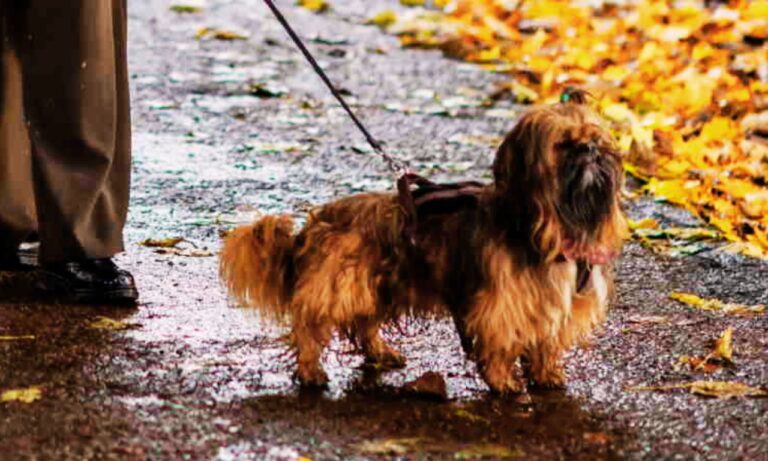Yorkshire Terriers, commonly known as Yorkies, are adorable and affectionate pets. As small-breed dogs with delicate necks, whether or not they should wear collars is a topic that requires careful consideration. A collar serves practical purposes, like holding identification tags, but can also pose health risks if used improperly. So, should Yorkies wear collars?
Below, I explore the benefits and risks of collars for Yorkies, including tips on selecting the right collar and alternatives to consider. Discover the benefits of using a harness by reading this guide on should a Collie wear a harness.
Blog Highlights
ToggleShould Yorkies Wear Collars?
So, should Yorkies wear collars? Yorkies can wear collars for identification purposes, but due to their delicate necks and risk of tracheal injury, a harness is often a safer choice, especially for walks. If using a collar, ensure it is properly fitted and not used for leash attachment to prevent pressure on their sensitive trachea. The recommended size collar for an English Cocker Spaniel usually ranges from 12 to 18 inches, providing a snug and comfortable fit for your dog.
Benefits of Collars for Yorkies
- Identification and Safety: Collars are essential for holding identification tags, which can include your dog’s name, your contact information, and other important details. This helps ensure your Yorkie can be quickly reunited with you if they get lost. Adding a microchip can provide an additional layer of security in case the collar is lost or removed.
- Fashion Accessory: Collars can also be fashionable, allowing you to personalize your Yorkie’s style. There are a variety of options, such as leather collars, bowtie collars, and even collars adorned with rhinestones or other decorations. Some Yorkies may wear collars for aesthetic reasons, enhancing their cuteness and charm while ensuring they are safe.

Potential Risks of Collars for Yorkies
Despite the benefits, there are notable risks associated with putting a collar on a Yorkie:

- Tracheal Injury: Yorkies are prone to tracheal collapse—a condition where the cartilage in their windpipe weakens, leading to episodes of coughing or difficulty breathing. A collar that places pressure on the Yorkie’s neck, especially when they pull on a leash, can exacerbate this condition. When Yorkies get excited and pull against the leash, this pressure can lead to wheezing, coughing, and even more severe respiratory issues.
- Risk of Choking: The delicate structure of a Yorkie’s neck means that an improperly fitted collar can easily cause choking. A collar that is too tight will restrict breathing, while one that is too loose may get caught on objects, increasing the risk of accidents.
- Physical Strain and Injury: Yorkies, with their small and sensitive necks, are particularly susceptible to injury from certain types of collars. Choke and prong collars, for example, can cause serious harm and discomfort to these petite breeds, potentially leading to spinal and hip problems over time.
Choosing the Right Collar for Your Yorkie
If you decide to use a collar, selecting the right one for your Yorkie is essential for their comfort and safety. Here are some factors to consider:

- Size and Fit: The collar should fit snugly around your Yorkie’s neck, but not too tightly. It is recommended that you should be able to slide two fingers comfortably between the collar and your dog’s neck. This ensures it is tight enough to stay on but loose enough not to cause discomfort or restrict breathing.
- Material: Opt for soft and lightweight materials like nylon or fabric. Leather collars, while stylish, may be too heavy for a small dog like a Yorkie. Avoid materials that might cause skin irritation or contain sharp edges, as Yorkies often have sensitive skin.
- Safety Features: Safety features such as a breakaway clasp or reflective stitching are important considerations. A breakaway clasp ensures that the collar will release if it gets caught on something, reducing the risk of injury. Reflective stitching can improve visibility during nighttime walks, making your Yorkie safer in low-light conditions.
- Avoid Certain Types: Collars like choke chains or martingale collars should generally be avoided for Yorkies due to the risks they pose to the trachea and neck. Traditional flat collars with a buckle or safety release are typically safer choices for this breed.
Alternatives to Collars: Harnesses
Given the potential risks, many experts recommend using a harness instead of a collar for Yorkies. Harnesses provide the following benefits:
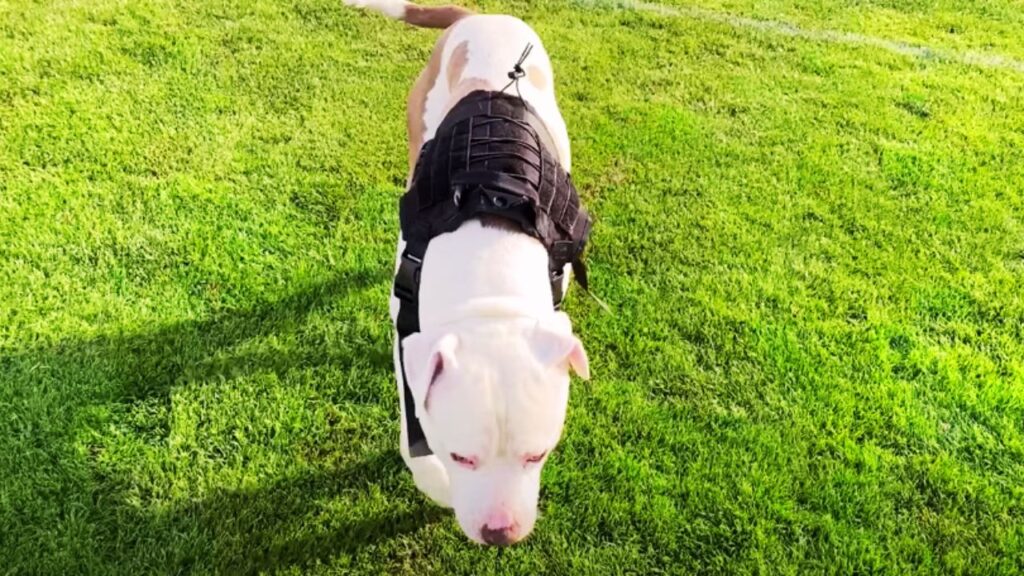
- Reduced Neck Pressure: A harness redistributes pressure across the chest and shoulders rather than the neck, making it a safer choice for Yorkies. This is particularly important if your Yorkie tends to pull on the leash during walks. It helps prevent neck and trachea injuries.
- Better Control: Harnesses offer more control over your Yorkie, which is useful when navigating busy streets or when unexpected situations arise. This extra control helps keep your pet safe without putting pressure on their neck.
- Escape Prevention: Unlike collars, which can sometimes slip off, harnesses provide a more secure fit, reducing the likelihood that your Yorkie will escape.
However, it’s important to ensure the harness is properly fitted. A poorly fitting harness can still pose a risk of injury or allow the dog to escape. When choosing a harness, look for one that is easy to put on, adjustable, and comfortable for your Yorkie.
Gradually Introducing Collars or Harnesses
If you choose to have your Yorkie wear a collar, it’s important to introduce it gradually. Start by allowing them to sniff and inspect the collar before putting it on. Keep initial wearing sessions short and gradually increase the duration as your Yorkie becomes more comfortable with it.

Positive reinforcement—using treats, praise, and gentle encouragement—can help create a positive association with the collar or harness. To find the perfect fit, learn more about what size collar for a Bichon, ensuring your dog’s comfort and safety.
Practical Tips for Using Collars with Yorkies
- Monitor for Discomfort: Observe your Yorkie closely when they are wearing a collar. Signs of discomfort, such as scratching, whining, or coughing, may indicate that the collar is too tight or unsuitable.
- Remove During Playtime: To reduce the risk of injury, consider removing the collar during unsupervised playtime, especially if your Yorkie tends to explore tight spaces or interacts with other dogs. This minimizes the chances of the collar getting caught or causing harm.
- Proper Identification: If you are using a harness for walks, you can still use a collar solely for identification purposes, but make sure it’s comfortable and doesn’t cause any strain. Alternatively, tags can be attached to the harness itself.
Training a Yorkie to Use a Collar or Harness
Proper training is essential for ensuring that your Yorkie is comfortable wearing a collar or harness and is responsive during walks. Yorkshire Terriers are intelligent dogs, but they can also be strong-willed. Training your Yorkie to get accustomed to a collar or harness and teaching them leash manners requires patience and positive reinforcement.
1. Early Training and Socialization
The best time to introduce a collar or harness is when your Yorkie is still a puppy. During the early stages of a Yorkie’s life, they are more adaptable and open to new experiences, which makes it easier to get them comfortable with a collar or harness.
Begin by letting your Yorkie explore the collar or harness without putting it on. Allow them to sniff and inspect it. Reward them with treats and positive reinforcement to create a positive association. Discover the ideal option by exploring what is the best collar material for a Bichon Frise to ensure your pet’s comfort and durability.
Puppies can be particularly fussy about wearing anything around their neck or body for the first time. For this reason, keeping initial wearing sessions short is advisable. The goal is to gradually get them accustomed to the sensation of having something on their body. Praise them during and after each session to ensure they associate the experience with something positive.
2. The Importance of Leash Training
Yorkies, like many small dogs, can develop a tendency to pull on the leash, especially if they are excited. This behavior can lead to tracheal damage if the Yorkie is wearing a collar, which is one of the primary reasons many owners prefer harnesses. Whether you choose a collar or harness, leash training is an important aspect of ensuring the safety of your Yorkie during walks.
Begin leash training indoors or in a safe, enclosed area. Let your Yorkie wear the harness or collar with the leash attached and allow them to walk around freely. Reward them when they stay close to you or follow commands, such as “come” or “heel.” Avoid yanking or pulling on the leash, as this can cause fear and discomfort, leading to negative associations with the harness or collar.
3. Positive Reinforcement Techniques
Yorkies respond well to positive reinforcement techniques, such as treats, praise, and affection. When introducing a collar or harness, provide rewards whenever your Yorkie shows calm and cooperative behavior. Gradually extend the time they wear the harness or collar, and consistently reward them for remaining calm and relaxed.
It is also helpful to use distraction techniques during the training process. For instance, engage your Yorkie in play or provide them with a favorite chew toy while wearing the collar or harness. This helps shift their focus away from the new sensation and makes the experience more enjoyable.
4. Correcting Undesirable Behaviors
Some Yorkies may try to scratch off a collar or harness or may refuse to walk when wearing it. To address these behaviors, it’s important to remain patient and not force the Yorkie to comply. Instead, redirect their attention with treats or toys, and reward them when they stop the unwanted behavior.
If your Yorkie pulls on the leash, consider stopping and standing still until they calm down. This teaches them that pulling does not lead to forward movement and encourages better leash manners. The American Staffordshire Terrier’s coat type is short, sleek, and easy to maintain with regular brushing.
If your Yorkie continues to resist wearing a collar or harness, consult with a professional dog trainer. A trainer can help identify the cause of the resistance and develop a customized training plan to address it.
It is also important to ensure that the collar or harness is comfortable and properly fitted—sometimes resistance is due to discomfort or pain caused by an ill-fitting accessory.
5. Gradual Exposure to Outdoor Walks
Once your Yorkie is comfortable with wearing the collar or harness indoors, it is time to gradually introduce them to outdoor walks. Start in a quiet area with minimal distractions, and keep the walks short initially. Allow your Yorkie time to get used to the sights, sounds, and smells of the outdoors. Reward them for walking calmly and staying close to you.
Conclusion: Should Yorkies Wear Collars?
Whether a Yorkie should wear a collar depends on various factors, including their behavior, health condition, and the purpose of the collar. Collars can be a useful accessory for identification and fashion, but they must be used carefully to avoid health risks. Due to their small size and susceptibility to neck injuries, harnesses are often a safer choice for Yorkies, particularly during walks.
Ultimately, if you decide to use a collar, ensure it is lightweight, properly fitted, and used in a way that does not place pressure on the neck. For daily walks or more secure control, consider using a harness instead.
By making informed choices about the type of collar or harness, you can ensure that your Yorkie stays both stylish and safe. Hope so, now you know the answer: Should Yorkies wear collars? For a step-by-step guide on how to wear collar to an Affenpinscher, check out this detailed article to ensure a comfortable and secure fit for your dog.


